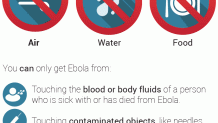The latest case of a positive Ebola test in the United States sparked immediate concerns about who may have been exposed and helped shed light on how the potentially deadly virus is, and isn't, spread.
Craig Spencer, a doctor who recently returned from West Africa, where he was on an Ebola assignment for Doctors Without Borders, tested positive for the virus Thursday at Bellevue Hospital Center in New York reporting a fever and gastrointestinal symptoms, a source familiar with the results told NBC New York.
Ebola can only be spread by infected people who show symptoms, the Centers for Disease Control and Prevention said. If an exposed person does not develop symptoms within 21 days of exposure, the person will not become sick with Ebola, according to the CDC.

"There is no risk to people who have been in contact with those who have been sick with Ebola and recovered, or people who have been exposed and have not yet shown symptoms," the CDC's director Dr. Thomas Frieden explained last month, after the first patient tested positive in the United States.
That patient, Thomas Eric Duncan, recently flew to the United States from Liberia, one of the West African countries now grappling with a deadly Ebola outbreak. Because he showed no signs of sickness until four days after landing in the U.S., however, officials are not worried about travelers who were on the plane with him. Duncan died on Oct. 8 in a Dallas hospital.
The initial spread of the Ebola virus to humans is unknown, although researchers believe that "patient zero" in the recent West Africa outbreak became infected through contact with an infected animal, possibly a bat, according to the Centers for Disease Control and Prevention.
U.S. & World
The day's top national and international news.
How Ebola Is Spread:
Once a person is infected, the CDC said there are several ways Ebola can spread to other people:
- Touching the blood or body fluids of a person who is sick with or has died from Ebola, including urine, saliva, breat milk, feces, vomit and semen. To become infected with the virus, you would need to get some of the ill person’s bodily fluids into your mouth, nose, or eyes, or into your body via a cut or a needle stick. Doctors say that there is no evidence anyone has ever been infected via sweat.
- Touching objects contaminated with the virus, like syringes or other medical equipment
- Touching infected animals, by contact with blood or fluids or infected meat
- A cough from a sick patient could infect someone close enough to be sprayed with droplets of mucus or saliva. People dealing with anyone who may be ill are told to stand at least three feet away, preferably six. Being within three feet of a patient for a prolonged time, without wearing protective gear, is considered direct contact, according to Frieden.
- According to a new Ebola situation assessment issued by the World Health Organization on Monday, saliva and tears may also carry some risk. "However, the studies implicating these additional bodily fluids were extremely limited in sample size and the science is inconclusive, W.H.O. said. "In studies of saliva, the virus was found most frequently in patients at a severe stage of illness. The whole live virus has never been isolated from sweat."
Direct contact through broken skin or mucus membranes is key, as the CDC said Ebola cannot be spread through the air (the virus doesn't drift through the air like germs that cause measles or tuberculosis) or by water or food. However, that may not have been the case in some cases in Africa, where Ebola may have been spread through the handling of wild animals hunted for food and contact with infected bats, according to the CDC.
What Are the Symptoms of Ebola:
The following symptoms can appear from two to 21 days after exposure:
- Fever
- Headache
- Diarrhea
- Vomiting
- Stomach pain
- Unexplained bleeding or bruising
- Muscle pain
Generally, after 21 days, if an exposed person has not developed symptoms, he or she will not become sick, the CDC said.
However, the Ebola virus has been found in semen for up to three months after exposure, so those who have recovered from the virus are advised not to have sex, or else only to have sex using condoms, during that time, according to the CDC.
Are Patients Who Recover From Ebola Immune for Life?
Evidence shows that people who recover from Ebola infection develop antibodies that last for at least 10 years, or longer, according to the CDC. But it's not known if people who recover are immune for life or if they can become infected with a different species of Ebola.
Can Ebola Be Passed on the Subway?
Spencer rode the subways, A, L and No. 1 since arriving in New York on Oct. 17, according to officials. Until Thursday morning, his temperature was normal and he was not experiencing any of the early symptoms of Ebola disease.
No one has conduced tests on Ebola transmission on subways, according to The New York Times, but no case of transmission to a human from a dry surface has ever been confirmed and there are no known instances of transmission on public transport in Africa. The C.D.C. has said there is “no epidemiological evidence” for transmission from hospital surfaces, including bed rails and door knobs – which are similar to subway poles and a bus handles.
Can Ebola Mutate to Become Aiborne?
According to experts, it is very unlikely that the virus would mutate to become airborne. The Ebola virus has not previously mutated in this way, and experts say there is no other virus that has changed from non-airborne to airborne in humans.
Can Mosquitoes Spread Ebola?
There is no evidence that mosquitos or other insects can transmit the virus, according to the CDC. Only mammals (for example, humans, bats, monkeys and apes) have shown the ability to spread and become infected with Ebola virus.
How Long Does the Ebola Virus Live:
The virus can survive for a few hours on dry surfaces like doorknobs and countertops, according to the C.D.C. It can, however, survive for several days in puddles or collections of body fluid at room temperature. It is not clear how long it may survive in soiled linens and clothing.
A thorough cleaning with hospital-grade disinfectants (such as household bleach) will kill Ebola.
How Can Travelers Protect Themselves:
The CDC said travelers can do several things to protect themselves when visiting the area where the outbreak is occurring, including:
- Wash your hands frequently or use an alcohol-based hand sanitizer.
- Do not touch the blood and body fluids of an ill person or the body of someone who has died from Ebola.
- Do not touch bats and nonhuman primates or their blood and fluids and do not touch or eat raw meat prepared from these animals.
- Avoid hospitals where Ebola patients are being treated. The U.S. Embassy or consulate is often able to provide advice on facilities.
- Seek medical care immediately if you develop fever (temperature of 101.5oF/ 38.6oC) and any of the other following symptoms: headache, muscle pain, diarrhea, vomiting, stomach pain, or unexplained bruising or bleeding.
There is no vaccine for the Ebola virus, but researchers are currently testing two.



